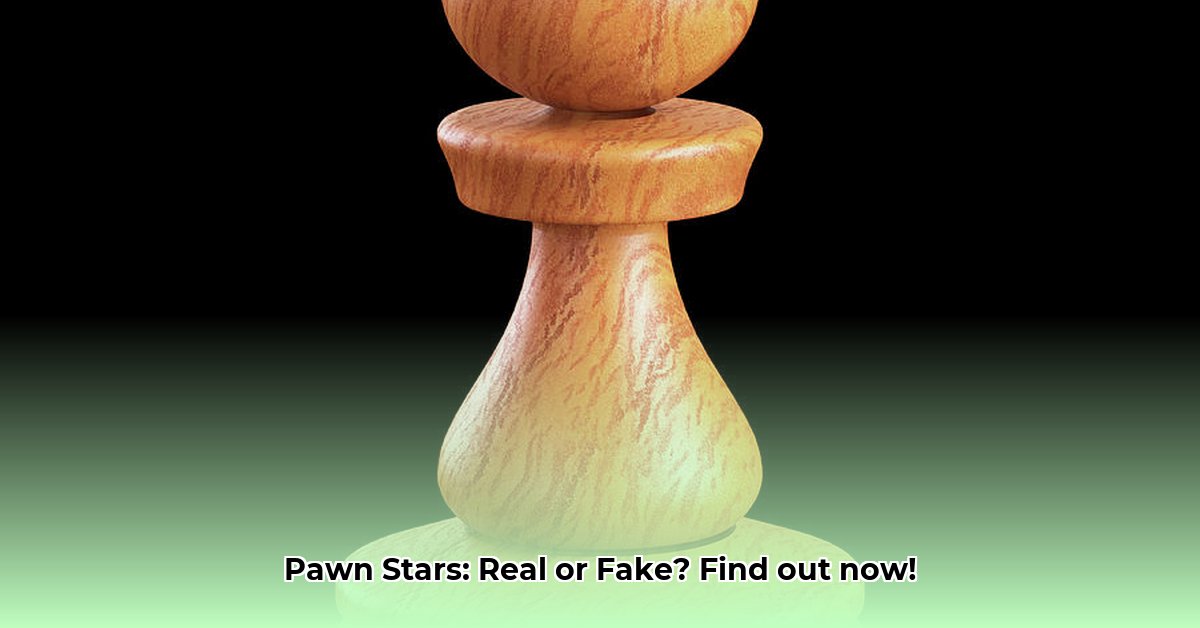Have you ever wondered if everything you see on Pawn Stars is actually real? It’s a question that’s popped up a lot, and honestly, the answer isn’t a simple yes or no. For a deeper dive into the show’s authenticity, check out this article. This article dives deep into the show, looking at all the angles – the good, the bad, and the maybe-a-little-too-good-to-be-true. We’ll examine claims that the show is staged, look at what experts say, and weigh the evidence to figure out just how much of Pawn Stars is genuine pawn shop action and how much is, well, TV magic. Get ready to have your assumptions challenged – this is going to be interesting.
Decoding Pawn Stars: Separating Fact from Fiction
So, was Pawn Stars all smoke and mirrors, or was it the real deal, a compelling appraisal uncovering valuable items? The truth, as with many things, is a little more complicated than a simple yes or no. While genuine transactions likely happened, the show’s creators definitely used some clever techniques to spice things up for our viewing pleasure. Let’s dive in and see how reality television portrays a pawn shop.
Arguments For and Against the Staging Claims
The internet is ablaze with discussions about the authenticity of Pawn Stars: Is it all real, or mostly fabricated? Some believe it’s heavily manipulated, pointing to a number of factors. For example, items and even the people bringing them in are probably screened beforehand. This ensures the show features interesting items and engaging personalities – the kind that lead to exciting appraisals and dramatic moments. Producers likely coached participants, subtly guiding conversations to create more compelling television. And then there’s the editing – strategic cuts and choices highlight the juiciest parts, building suspense and making for a more exciting viewing experience. Even the shop’s appearance on screen differs wildly from reality, with a much bigger gift shop added for the tourists. Regular customers are often swapped out with chosen extras, creating a more controlled environment.
On the other hand, many argue that the heart of the show remains authentic, highlighting the show’s popularity and success. They believe Rick, Chumlee, and Corey’s appraisals are genuine. These guys have real expertise, and while the show might subtly guide the process, the final deals probably aren’t completely fabricated. The value of the items, they insist, is real, even if the overall situation is a little… staged.
A Closer Look at the Evidence: The Smoke and Mirrors
Let’s break down the claims and examine the evidence that may confirm or dismiss these circulating claims. The pre-screening of items is hard to deny, impacting what treasures are displayed on our screens. While not necessarily dishonest, it dramatically changes how accurately the show reflects a typical day at a pawn shop (a business that accepts items as collateral for loans). According to Travis Benton, the pawn shop’s general manager, staff notify show producers when a particularly interesting item comes in. If it’s deemed worthy of filming, the sellers get instructions on how to act. This carefully curated selection process optimizes the viewer experience.
Similarly, coaching participants doesn’t automatically mean everything is fake. It’s more like directing a play – guiding the performance, shaping how things are presented. Rocco Landi, another pawn shop employee, told the Las Vegas Review-Journal that sellers have been cut from the show for appearing too awkward on camera. The goal is to make sure the seller appears comfortable and engaging.
Strategic editing is standard practice in reality TV; it’s what keeps viewers hooked, offering a captivating experience that may not be entirely authentic. Pawn Stars is a masterclass in this. The use of extras instead of regular customers further distorts reality. A true pawn shop is much busier and far less controlled than what we see on TV. The show, therefore, presents a highly polished, almost artificial version of events. In 2016, Mike Hoover, an extra on the show, explained on Reddit that a single scene took almost an hour to film and included multiple takes and reshoots.
The question of pre-arranged deals is where the debate gets really heated. Although the producers deny completely scripting the interactions, evidence points towards a degree of narrative control. Brent Montgomery, executive producer, stated that “scripters” are present to strategically feed facts to the cast members and shape the show’s narrative in real time. Is this reality television, or a carefully crafted narrative?
The Verdict: A Well-Crafted Narrative for Television
The available evidence strongly suggests that, although genuine appraisals and interactions certainly occur on Pawn Stars, a substantial degree of production intervention takes place. The show showcases a highly stylized version of everyday life in a pawn shop. It’s a carefully constructed drama designed for entertainment, not a completely accurate reflection of reality. How much is real, and how much is television magic?
The Bigger Picture: Ethical Considerations of Reality TV
This leads to important ethical questions about the extent of television manipulation, opening a vital conversation. How transparent should producers be about the level of manipulation in their shows? How does this carefully crafted reality affect viewers’ understanding of pawn shops and the appraisal process? These are complex issues needing careful thought. Both the History Channel and the production company have a responsibility to address ethical concerns. Academics and researchers could further explore the ethical gray areas inherent in reality TV. Viewers, likewise, should cultivate media literacy skills to approach reality shows with a critical eye. How can viewers navigate the nuances of reality television?
What’s Next? Moving Forward with Viewing Habits
Ultimately, the question of whether Pawn Stars was staged highlights the constant tension between creating engaging TV and presenting a realistic portrayal of events. Educated viewers are better equipped to understand the constructed nature of such programs. This requires a critical eye and a nuanced understanding of how reality television creates compelling content. Is reality television a reflection of life, or a manufactured spectacle?
| Stakeholder | Short-Term Actions | Long-Term Goals |
|---|---|---|
| Viewers | Develop more critical viewing habits | Demand more transparency from reality TV producers |
| History Channel | Improve disclosure of production techniques | Invest in more genuinely authentic programming |
| Pawn Stars Production | Be more transparent about production choices | Balance entertainment with truthful representation |
| Researchers/Academics | Investigate the effect of reality TV manipulation | Create guidelines for assessing reality TV authenticity |
The continuing discussion about the authenticity of Pawn Stars reminds us of the importance of critical thinking when consuming media. Always question what you see – and what you don’t. What makes a show truly authentic, and how can we, as viewers, demand greater transparency from producers?
How much of Pawn Stars is staged compared to reality? Unveiling the Truth
Key Takeaways:
- Pawn Stars uses pre-screening of items and participants, influencing the treasures we see on the show.
- Significant filming is condensed for broadcast, creating a seamless flow of events.
- Producers guide conversations and narrative flow, shaping the interactions.
- The show balances genuine transactions with staged elements, blurring the lines of reality.
- The extent of scripting and use of planted sellers remains unclear, shrouded in production techniques.
The Reality Behind the Reality TV Show
Let’s address the elephant in the Chumlee-shaped room: How much of Pawn Stars is staged compared to reality? The show’s creators skillfully weave a compelling narrative, but is it a true reflection of daily life at a pawn shop? The answer, like a good appraisal, requires careful examination. What influences the balance between reality and staging of Pawn Stars?
Multiple sources agree that Pawn Stars doesn’t simply capture random walk-ins. Items and potential sellers are pre-vetted; only the most exciting and potentially valuable ones make the cut. This pre-selection significantly shapes the show’s narrative. Think of it as choosing the juiciest plums from a basket—the rest are left behind. According to executive producer Brent Montgomery, one key aspect of the vetting process is ensuring that sellers are willing to sell at a reasonable price, otherwise they’re just trying to be on TV. How does pre-selection impact the show’s authenticity?
The Editing Equation: Captivating or Misleading?
Then there’s the editing. Hours of footage are condensed into tight, entertaining segments. This editing process naturally shapes the flow of events. We see concise negotiations, drama-filled haggling, and decisive moments – not the potentially tedious reality of a real-life pawn shop. What about the personalities? Are they entirely themselves? Sources suggest producers guide conversations, enhancing the drama for our viewing pleasure. As Mike Hoover explained, a simple sale could take an hour to film, only to be condensed into a five-minute segment. What happens to the narrative during editing?
The Spectrum of Authenticity: What’s Real and What’s Not?
So, is Pawn Stars completely fabricated? No. Genuine transactions undoubtedly occur. However, the extent of production intervention is undeniable. The show presents a carefully constructed reality—a heightened, entertainment-focused version of a pawn shop’s operations. It’s a delicate balance, a blend of authentic appraisal and manufactured drama. Where does Pawn Stars fall on the authenticity spectrum?
The Ethical Angle: Navigating the Grey Areas of TV
The show’s success rests on its captivating blend of reality and artifice. Is the manufacturing of reality for the purpose of entertainment ethical? This raises ethical questions for the History
- Discover Affordable Singing Lessons Near Me to Unlock Your Potential - February 24, 2026
- Affordable Vocal Lessons Bring Professional Singing Guidance Within Reach - February 23, 2026
- Local Vocal Lessons Offer Expert Guidance for Every Singer - February 22, 2026










